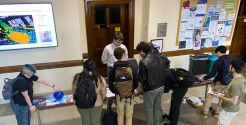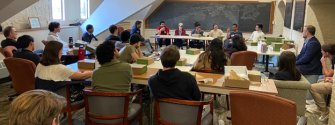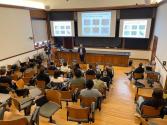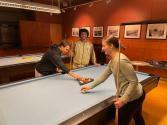SPS Zone Meeting
April 13, 2024
New Haven, CT
Meeting host: By:Nikita Mazotov
SPS Chapter:
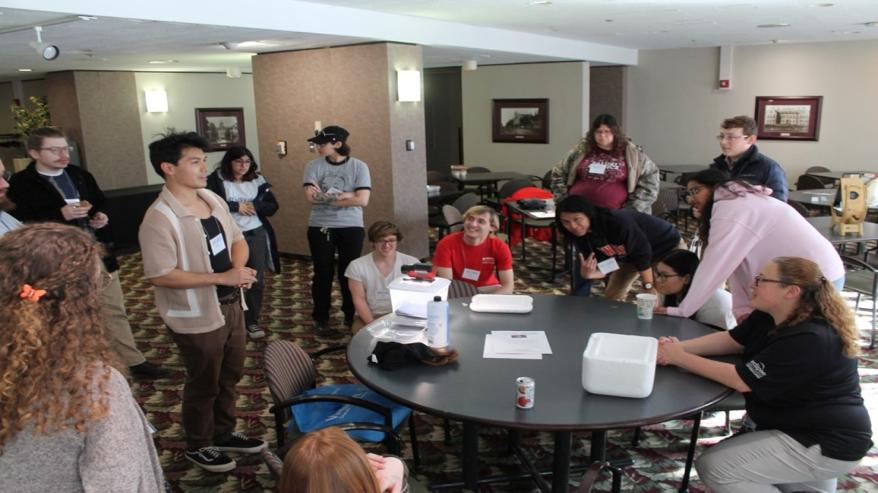
Narrative
In September, at the beginning of my sophomore year, I had newly joined the Yale Society of Physics Students board, and my primary task was to look into zone meetings for the upcoming academic year. The last meeting for Zone 1 had been held in April 2023, and a group of Yale SPS members had attended. But after a chat with Professor ngugliucci [at] anselm.edu (Nicole Gugliucci) - our Zone Councillor - it turned out that nothing was scheduled for the foreseeable future. Unless, that was, we wanted to schedule something ourselves.
And then we started digging. A date was decided; a building was selected and booked; a schedule was brainstormed; invitations were written and sent to a list of colleges in our zone, without a clear picture of what was going to happen, but with determination that something worthwhile will. Emails abounded and time flew by. It was in February that we finally decided that we were hosting and had a date, March that we applied for the funding, 1 day before the meeting that we had a final list of students we were hosting and about 5 minutes before I met Mattew from St. Anselm College that I received and printed copies of the finalised meeting schedule. But after months of work, on a windy, wet Friday evening in April, we were finally greeting visiting students on Yale campus.
While we set the event start day to Saturday the 13th, we invited guests to stay overnight if that helped with travel. We therefore had a small group of visitors to hang out with us on Friday evening, and a natural destination seemed to be a bubble tea shop that was nearby. After an hour or so of drinking tea and games of pool, we paired up all guests with their hosts and broke for the evening.
Saturday started with a tour of Yale’s Wright Laboratory. At 9:30am, graduate student Michael Jewell met students and Professor Gugliucci at the front entrance of Wright lab. He offered a walking tour, beginning with the vault, and circling through the different labs and facilities offered. He talked about the Lab’s history as well as current collaborations with non-physics organisations on-campus and its plans for expansion. He gave detailed descriptions of the different lab groups, offering particular insight on his work on the HAYSTAC experiment and giving Aaron Chizhik (our SPS president) the opportunity to talk about the CUORE/CUPID collaboration. At the end of the tour, Aaron and Andrew Nupp (our vice-president) responded to questions regarding undergraduate research opportunities at Yale.
We then shepherded everyone into our conference building and handed out some swag received from the National SPS office, as well from the Yale Physics Department. To my deepest regret, the SPS Cow stickers ran out almost immediately. The sticky notes and pens were also popular picks. But after spending some time distributing memorabilia as well as drinking morning coffee, we were well underway with a welcome from the Yale Physics Department Chair - Professor Karsten Heeger - and Professor Gugliucci. We continued with talks from visiting faculty. Professor Timothy Atherton from Tufts discussed shapeshifting in soft matter. Professor Elliot Horch gave a talk on the hardware of telescopes - specifically, about the Integral Field Unit Speckle Imager. Representing Yale was our SPS Faculty Advisor, Professor sarah.demers [at] yale.edu (Sarah Demers), with a crash course on particle accelerators in High Energy Physics, the differences between them, and the planned future accelerator projects. The presentations were short but covered a lot of ground in different fields of physics, and it was good to hear from faculty members from different institutions in Zone 1. Hearing about research that goes on in other colleges and that our peers are getting involved with is valuable - it fosters a feeling of a physics community that is broader than just your college.
We then broke for lunch, during which I got to talk to some visitors from Tufts about fields of physics, hobbies and clubs (specifically rock climbing), and what we think about linear algebra. We also brought up courses focused on experiment and realised that the experiments that these courses cover tend to be the same ones across our colleges - for example, the Millikan Oil Drop experiment. Lunch was followed by a graduate school panel, made up of current Yale Graduate students as well as some undergraduates who had applied for graduate programs.
The graduate school panel was possibly the highlight of the day - so many questions were asked from the floor that the panel doubled in length from what we originally intended, but we took that as a good sign of interest. We asked our panellists to introduce themselves, their research and whether they were currently in graduate school or whether they had just applied. We then opened the discussion up to the guests’ questions, which included how to write a research statement during application and how it differs from undergraduate application essays, whether or not to take a gap year and how to decide whether graduate school is even right for you. With 6 panellists, we had a range of experiences and thoughts, and how different students were handling graduate school was a good learning experience. One of the graduate students on the panel actually used to study at Tufts and knew Professor Atherton who was visiting, which made for a sweet reunion. My takeaway was that graduate school is much more flexible than undergrad, and that the experience is what you want it to be, which is exciting to me as someone thinking about grad school in the future.
We then moved on to student presentations - topics included using data from the James Webb Space Telescope to study the life cycles of stars and galaxies, black hole relativistic jets, and muon background mitigation in the CUORE neutrinoless double-beta decay experiment. We had two presenters from Tufts and two from Yale, and it was amusing that three of the four presentations were about astrophysics. We also held a physics trivia and general knowledge quiz, consisting of difficult questions which were nonetheless very competently answered by the participants. For this quiz, we split the group into two teams and did not track scores to keep it informal, and we also sprinkled in some general knowledge .
As the principal organiser of the meeting, I believe it went well - all our events worked, guests seemed happy, and food was available. I am proud of what our team was able to accomplish on relatively short notice. I enjoyed both the student and the faculty research presentations - I am grateful to the speakers not only for volunteering their time to give a talk - but also for keeping the level of the talks very engaging and undergraduate-focused. I would also like to thank all our panellists for their thoughtful responses to many good questions. I sent out a post-meeting feedback form, and according to the responses from our guests, the lab tour was particularly well received, as well as the opportunity to chat with students from other colleges to share and compare experiences over lunch and coffee.
I hope that other chapters in Zone 1 will carry forward the momentum this meeting has generated. I thoroughly enjoyed the chance to see how other people think about physics, whether that be research, courses or even just the trivia facts you happen to know. I look forward to running into familiar faces at future SPS events, and I am grateful to everyone who came to visit us in New Haven - I hope the attendees enjoyed it as much as we did.
Agenda
|
Time |
Location |
Event |
|
9:30AM |
Wright Lab, 272 Whitney Ave, Parking Lot Entrance |
Yale Science Tour (Optional) |
|
10:00AM |
Sloane Physics Laboratory (SPL), Room 57, 217 Prospect St |
Coffee (Provided) |
|
10:30AM |
SPL 57 |
Welcome from Prof. Karsten Heeger |
|
10:35AM |
SPL 57 |
Welcome from Zone Councillor, Prof. Nicole Gugliucci |
|
10:40AM |
SPL 57 |
Faculty Research Talks Professor Timothy Atherton, Tufts University: Shapeshifting in Soft Matter
Professor Elliot Horch, Southern Connecticut State University: Effusive about IFUSI: Planet Hunting with the Integral Field Unit Speckle Imager
Professor Sarah Demers, Yale University: Energy Frontier in Particle Physics |
|
12:05PM |
SPL 57 |
Lunch (Provided) |
|
12:50PM |
SPL 57 |
Graduate Student Panel |
|
1:30PM- 3:30PM |
SPL 57 |
Student Research Presentations |
|
3:30PM |
SPL 57 |
Coffee Break (Provided) |
|
4:00PM |
SPL 57 |
Science Trivia Quiz (Optional) |
|
5:00PM |
SPL 57 |
Physics Movie Night (Optional) |
Attendees
~ 20 undergraduate students and 3 visiting faculty, 2 Yale faculty (Professor Demers and Professor Heeger) as well as 5 Yale graduate students. Visitors from Tufts, Southern Connecticut State University, University of Massachusetts Dartmouth, Saint Anselm College and Providence College (and Yale)
Recommendations
- Ensure a schedule is finalised as early as possible. This may be difficult if the agenda includes presentations, as the number of presentation slots dictates scheduling. Therefore find out who would like to present as early as possible, and/or be willing to be flexible with scheduling
- Do not get disheartened by a small number of responses. Of the 31 colleges I reached out to in Zone 1, 5 visited, and with fewer members than they originally intended to. This is normal. A large attendee base is not a prerequisite for a good zone meeting.
- Ask for advice whenever possible, especially from your Zone Councillor. Professor Gugliucci has been very helpful in our meeting organisation

